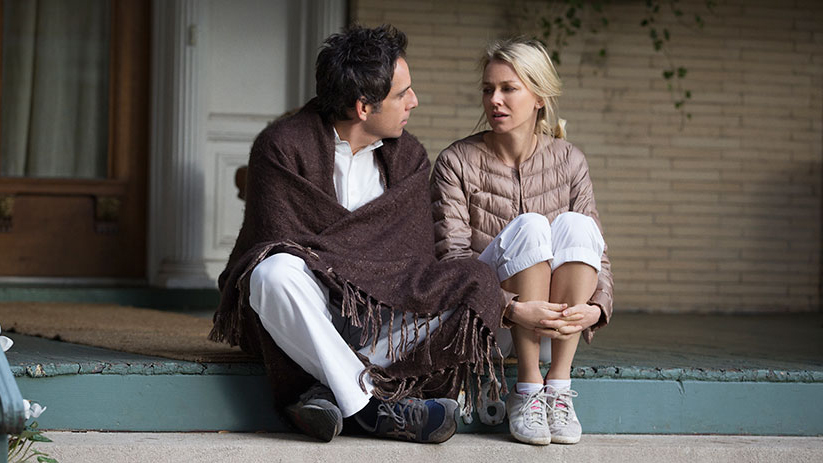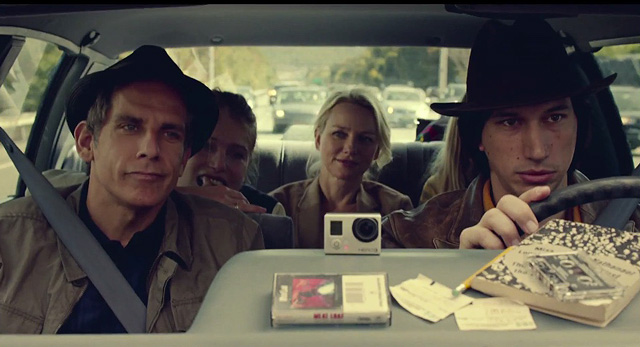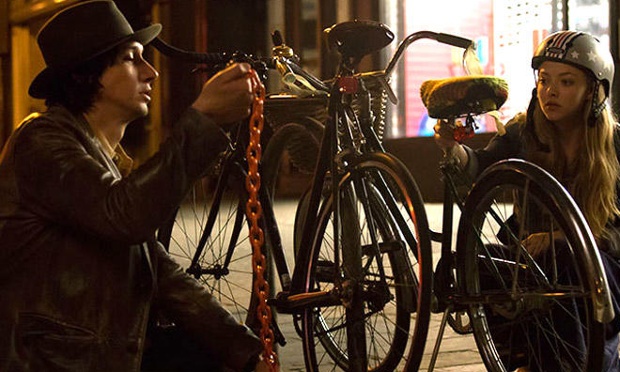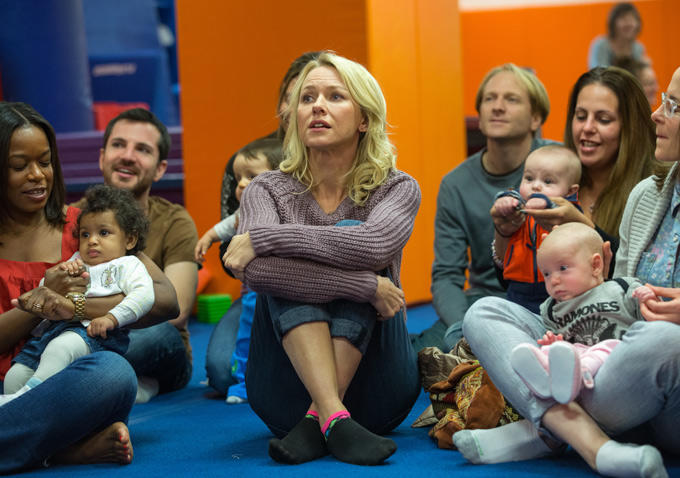In our culture of cool, we worship the new, the fresh, and (above all) the young. So balancing the practicalities of aging with what relevance requires can be a real drag.
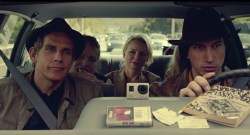 Jon Pack / A24
Jon Pack / A24That’s the dilemma for Josh (Ben Stiller) and Cornelia (Naomi Watts), the fortysomething couple at the center of Noah Baumbach’s While We’re Young. Childless at a time when all of their couple friends are having babies, Josh and Cornelia forge a new friendship with a twentysomething pair of Brooklyn hipster royalty: Jamie (Adam Driver) and Darby (Amanda Seyfriend). Though Josh and Cornelia are themselves aging hipsters (Josh is a documentary filmmaker who listens to Wilco, loves Godard, and likes to discuss Ricoeur’s “hermeneutics of suspicion”), they’re clearly hungry for their newfound friends to bring them up to speed on all things cool.
Laughs ensue. The film’s fast-paced first half gives us gag after gag of the older couple trying to keep up with the younger couple’s trendy way of life. Jamie and Darby are the epitome of artisan, small-batch, analog Brooklynites. They raise chickens, build everything by hand, wear thrift store clothes and ride fixed gear bikes (without helmets). Darby has an artisanal ice cream business where she makes flavors like “avocado almond milk sorbet.”
Despite suffering from arthritis and shin splints, Josh and Cornelia join the young couple for hip hop dance classes, syncretistic spiritual retreats, and “street beach” parties in Bushwick. They’re fascinated and energized by the young couple’s apparent passion for life and seemingly authentic disregard for the rat race.
One of the most hilariously accurate sequences shows how the older couple’s perception of “cool” technology is out-of-step with their younger hip counterparts. Where Josh consumes media on Apple TV and iTunes (and assumes he’s ahead of the curve), Jamie uses VHS and a record player. Where Josh cares about things like copyright and privacy, Jamie (also an aspiring documentary filmmaker) is ambivalent about such relics of a pre-Internet, pre-everything-is-filmed era.
Though at first Josh sees Jamie as a sort idealized, pre-jaded version of himself, eventually the romanticism wears off and Josh grows resentful, even hostile toward the younger man’s charmed existence.
Much of Josh’s resentment stems from his own middle-aged rut: He’s been working on the same documentary for seven years (a would-be opus about class, war, capitalism . . . “it’s really just about America”) but hasn’t been able to finance or finish it. Is he out of touch with the art form and the intellectual climate he thought he knew so well? Meeting Jamie, Darby and their friends has him less confident and more fearful than ever.
Fear is a major theme of While We’re Young, seriously explored even when played for laughs. The movie begins with a quote from Henrik Ibsen’s “The Master Builder” about fearing the young, and the opening and closing scenes show Josh and Cornelia face to face with babies they have no idea what to do with. Their fear of parenthood is mostly a fear of relinquishing their own claim on youthfulness, and their relationship with Jamie and Darby showcases their fear of becoming obsolete in a fast-moving world where one’s attempts at relevance (joining Facebook, for example) turn out to be hopelessly passé.
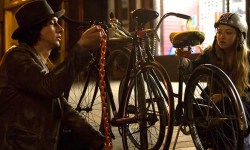 Jon Pack / A24
Jon Pack / A24Like Baumbach’s preceding film, the wonderful Frances Ha (2002), While We’re Young is about individuals in limbo between life stages, learning to embrace the fearsome reality of growing up. Where Frances approached it from the perspective of a twentysomething (Greta Gerwig) who probably would have been friends with Darby and Jamie (Adam Driver is also in Frances), Young adopts the point of view of someone closer to 45-year-old Baumbach himself.
Indeed, one takeaway from both films is the consolation that no one—not even the trendiest young person in the world—is free of the existential dread of time and aging.
Baumbach made a movie about an aging filmmaking trying to walk the line between artistic relevance and middle-aged authenticity, which means he’s probably plumbing a bit of his own neuroses. The style and pacing of the film reflects two distinct halves that are perhaps Baumbach’s nod to the tension he feels between youthful experimentation and more settled storytelling. The film’s first half is slick and sharp, self-consciously cut in a way that draws attention to its clever juxtapositions; it is storytelling by a filmmaker (perhaps in the vein of Jamie?) who has just discovered Eisenstein’s montage theory and wants you to know it. The film’s second half is slower and more interested in cerebral theory than stylistic showmanship; it is more Woody Allen than Wes Anderson (perhaps in the vein of Josh?).
The two halves are also tonally different: the first is funny and whimsical and the second is serious and (at times) sad. I enjoyed the first half more but found the second half thought-provoking; in the end the conclusion is perhaps that the youthful avant-garde and the wise perspective of age both have their place. As Josh and Cornelia eventually come to discover, the most relevant thing they can do is to embrace their age and pursue their passions authentically.
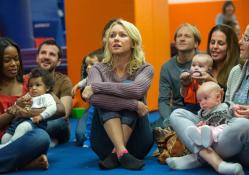 Jon Pack / A24
Jon Pack / A24In a world that beckons us to relevance and pushes us to pay heed to the eternal new and now, it can be easy to live in perpetual unsettledness and willful avoidance of commitment and growth (let alone realism about mortality). It’s no wonder that “extended adolescence” is increasingly a thing we observe (and make Adam Sandler movies about).
Yet there is a beauty in embracing the maturity, discipline and sacrifice of growing up—of “giving up childish ways,” as Paul famously writes (1 Cor. 13:11).
Noah Baumbach seems to be embracing it in movies like Frances Ha and While We’re Young, as are the collaborators he works with. Ben Stiller—who also starred in Baumbach’s Greenberg (2010)—hasn’t looked this comfortable in years, and it’s a fun treat to see Adam Horovitz of the Beastie Boys (now 48-years-old) so comfortably play a middle-aged dad. Meanwhile, 45-year-old James Murphy (aka LCD Soundsystem) contributes a minimalist soundtrack (including David Bowie covers) that will surely end up being one of the year’s best. These guys prove that forty-something dads can indeed be relevant, perhaps most when they aren’t trying all that hard to be.
Caveat Spectator
While We’re Young is rated R for language (lots of f-words) and some sexual innuendoes. There is also a scene of extensive vomiting, which may not be your cup of tea.
Brett McCracken is a Los Angeles-based writer and journalist, and author of the books Hipster Christianity: When Church and Cool Collide (Baker, 2010) and Gray Matters: Navigating the Space Between Legalism and Liberty (Baker, 2013). You can follow him @brettmccracken.

